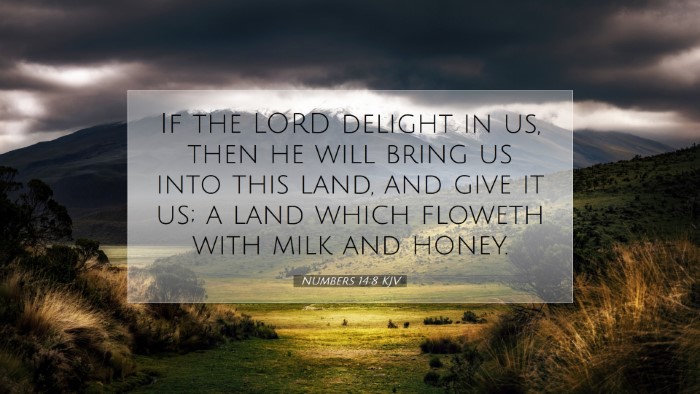Commentary on Numbers 14:8
Numbers 14:8 states: "If the Lord delight in us, then he will bring us into this land, and give it us; a land which floweth with milk and honey." This verse stands as a pivotal declaration of faith and trust in God's promises amidst Israel's moment of rebellion and doubt. A thorough examination, drawing from various public domain commentaries, reveals its depths.
Contextual Understanding
To fully appreciate the significance of this verse, one must consider its immediate context. Following the report of the twelve spies, the people of Israel were overwhelmed by fear and negativity, leading them to reject God's promise regarding the Promised Land. Here, Caleb, along with Joshua, expresses an unwavering faith that emphasizes the essential character of God's relationship with His people.
The Faith of Caleb and Joshua
Matthew Henry highlights that the faith of Caleb and Joshua serves as a stark contrast to the skepticism of the Israelite majority. They recognize that the Lord's delight is instrumental in determining Israel's fate. According to them, it is not merely human effort or military might that will secure the land, but the favor of God—this fundamental principle underlines the entire biblical narrative.
The Conditionality of God’s Promises
Albert Barnes elaborates on the idea that the phrase “if the Lord delight in us” implies a conditional aspect to God’s promises. The expectation set forth by Caleb and Joshua does not negate divine sovereignty but suggests that Israel's obedience and faithfulness are crucial for experiencing God's blessings. This reflects a broader theological theme within Scripture that emphasizes God's grace tempered with human responsibility.
Theological Implications
The verse can be seen as a microcosm of a greater theological truth: that God’s active involvement with His people is contingent upon their faithfulness.
-
The Nature of God’s Delight: The notion of God delighting in His people encapsulates a profound relationship. According to Adam Clarke, God’s delight signifies divine affection and pleasure, which suggests that God’s covenant relationship is alive and interactive.
-
Understanding the Land: The description of the Promised Land as one "flowing with milk and honey" signifies abundance and divine provision. It represents the fullness of life that God intends for His people, a vital concept that resonates throughout Scripture.
The Role of Leadership
Caleb and Joshua’s leadership is critical in this narrative. Their faith was not just personal; it served to inspire and rally the community towards the assurance of God's promise. Leadership within the church today, as Matthew Henry points out, should mirror this boldness in faith, reminding congregations of God's faithful provision.
Applications for Today
For pastors, students, and theologians, Numbers 14:8 challenges us to consider modern applications of faith and obedience. Following are several key takeaways:
-
Faith in the Face of Adversity: Just as Caleb and Joshua faced societal doubt, contemporary believers are called to uphold their faith in the midst of uncertainty. The challenge remains to trust in God’s promises despite overwhelming circumstances.
-
Understanding Conditionality in Faith: The verse encourages self-examination regarding one’s relationship with God. It instigates the question: "Does God delight in me?" which should prompt believers toward repentance and faithfulness.
-
Communicating God’s Promises: Like Joshua and Caleb, leaders in the church today are tasked with communicating the goodness of God and His promises, ensuring that congregations are challenged to believe in His provision.
-
Recognizing Divine Abundance: The imagery of the land "flowing with milk and honey" invites discussions around God's generosity and blessings that are often taken for granted. This teaches gratitude and the importance of recognizing God's hand in everyday life.
-
Encouragement Toward Unity: Caleb and Joshua’s convictions were crucial during a time of division and dissent. In the context of today's church, this verse serves as a call to unity based on shared faith in God’s promises.
-
Perseverance in Vision: When confronted with obstacles, leaders must maintain a vision rooted in God’s truth. This verse serves as a reminder to uphold and encourage perseverance in the pursuit of God's call, illuminating the path toward His promises.
Concluding Reflections
Numbers 14:8 encapsulates the heart of faith—a direct challenge to trust in God’s provisions and delight, even amidst doubt. As drawn from public domain commentaries by Matthew Henry, Albert Barnes, and Adam Clarke, this verse not only reflects historical truths but also speaks powerfully to contemporary believers. It serves as a timeless encouragement to anchor one's faith in the assurance of God’s love and guidance as we journey through life’s wilderness toward the promised land.


